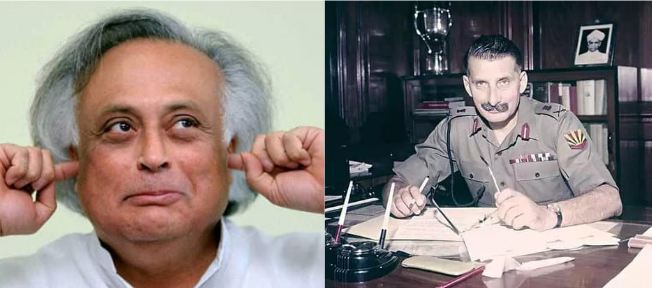- For the last few years, an effort is being carried out by Congress historians to whitewash the contribution of Sam Manekshaw, JFR Jacob and give all credit to Indira Gandhi, the then Prime Minister.
- In two recently released books Jairam Ramesh made an attempt to downplay the role of Sam Manekshaw in the 1971 victory against Pakistan.
- Sam Manekshaw’s brilliance was acknowledged by the entire nation during the 1971 Indo Pak War.
No matter how much one detests Leftists and Nehruvian for putting personal and family interests before the national interest, but one has to accept that they are master narrative builders and even better at whitewashing history. For the last few years, an effort is being carried out by Congress historians to whitewash the contribution of Sam Manekshaw, JFR Jacob and give all credit to Indira Gandhi, the then Prime Minister.
In two recently released books, namely Jairam Ramesh’s Intertwined Lives: P N Haksar And Indira Gandhi and Chandrashekhar Dasgupta’s India and the Bangladesh Liberation War: The Definitive Story, made an attempt to downplay the role of Sam Manekshaw in the 1971 victory against Pakistan.
Jairam Ramesh and Chandrashekhar Ghosh (a former top diplomat under multiple Congress governments) are both affiliated to the Grand Old Party in one way or other, so an impartial account cannot be expected from them. However, they are trying to make the other people involved in the equation look foolish and give Indira Gandhi all the credit for the victory.
Ghosh goes to the extent and argues about the infamous incident of Sam Manekshaw forcing Indira Gandhi to delay the attack on East Pakistan. In his book, Ghosh says that when Manekshaw came with this argument, Indira Gandhi has already decided on delaying the response against Pakistan and just used Army Chief’s advice as a ploy to convince other cabinet colleagues.
So far, hundreds of books have been written on the strategic brilliance of Sam Manekshaw. Most of Army accounts of the war single-handedly credit the brave officer for the victory against Pakistan, and blame the political administration for not being able to leverage this to negotiate on Pakistan occupied Kashmir in exchange for Prisoners of War.
However, Jairam Ramesh and Ghosh use the account of P N Haksar (Principal Secretary to Indira Gandhi) and P N Dhar (Head of Indira Gandhi’s secretariat) – both members of the infamous Kashmiri mafia in Indira Gandhi administration) to raise the status of Prime Minister and downplay that of General Sam Manekshaw.
Sam Manekshaw had been often unequivocal in his opinions, which is why he has had been at loggerheads with many yesteryear leaders of the then Congress government. He once famously said, “I wonder whether those of our political masters who have been put in charge of the defense of the country can distinguish a mortar from a motor; a gun from a howitzer; a guerrilla from a gorilla, although a great many resemble the latter.” Had it not been for ‘Sam Bahadur’, the scourge of caste-based reservation would’ve entered the Indian Armed Forces as well.
Sam Manekshaw’s brilliance was acknowledged by the entire nation during the 1971 Indo Pak War. Sam had openly refused to acknowledge the then Prime Minister Indira Gandhi’s orders of marching into Bangladesh [then East Pakistan] during the summer season. He asserted that ‘wars cannot be won without adequate preparation’. His suggestions were accepted without hesitation by Indira Gandhi and the rest, as they say, is history.
For his supreme brilliance as well as his administrative efficiency, Manekshaw was promoted to the rank of Field Marshal in 1972, the only Indian soldier to receive so in active service. However, Sam Manekshaw’s straightforward attitude didn’t go down well with the sycophants of the Nehru Gandhi dynasty, and he had to wait for a whole 35 years to get his dues as the Field Marshal, on the intervention of President Dr APJ Abdul Kalam. Sam Bahadur took his last breath on 27 June 2008 in his beloved Wellington cantonment.
Most of the military accounts agree on the major role played by Sam Manekshaw and JFR Jacob (Chief of Eastern Command) in the victory of 1971 and any attempt by Congress historians to downplay their bravery and contributions must be resisted. The role of Indira Gandhi was limited to political backing, and she should not be promoted as astute military mind, as Jairam Ramesh and Chandrasekhar Ghosh are trying to do.

























